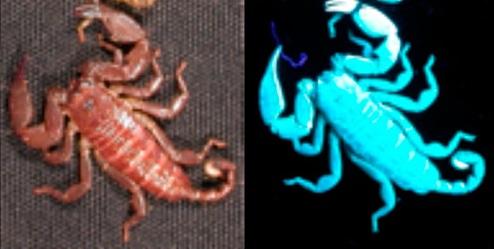
Credit: Adapted from Journal of Natural Products 2020, DOI: 10.1021/acs.jnatprod.9b00972
Most scorpions glow a blue-green color when illuminated by ultraviolet light or natural moonlight. Scientists aren’t sure how this fluorescence benefits the creatures, but some have speculated that it acts as a sunscreen, or helps them find mates in the dark. Now, researchers reporting in ACS’ Journal of Natural Products have identified a new fluorescent compound from scorpion exoskeletons. The team says that the compound could protect these arachnids from parasites.
More than 60 years ago, scientists first recognized scorpions’ propensity to glow under UV light. Until now, only two fluorescent compounds, β-carboline and 7-hydroxy-4-methylcoumarin, had been identified in scorpions’ hard outer shell, or exoskeleton. Masahiro Miyashita and colleagues wondered if there might be other fluorescent molecules with different chemical properties that were missed in previous studies.
To find out, the researchers extracted compounds from molted exoskeletons of the scorpion Liocheles australasiae, using chemical conditions different from those used in prior experiments. They purified the compound showing the most intense fluorescence and identified its structure, which was a phthalate ester previously shown to have antifungal and anti-parasitic properties in other organisms. This finding suggests that the new molecule, which the researchers found in several additional scorpion species, could help guard against parasitic infections in these creatures. Compared with the two previously identified fluorescent compounds, the new molecule likely contributes more weakly to scorpion fluorescence, the scientists say.
###
The authors acknowledge funding from the Sasakawa Scientific Research Grant from The Japan Science Society.
The abstract that accompanies this study is available here.
For more research news, journalists and public information officers are encouraged to apply for complimentary press registration for the ACS Spring 2020 National Meeting & Exposition in Philadelphia.
The American Chemical Society (ACS) is a nonprofit organization chartered by the U.S. Congress. ACS’ mission is to advance the broader chemistry enterprise and its practitioners for the benefit of Earth and its people. The Society is a global leader in providing access to chemistry-related information and research through its multiple research solutions, peer-reviewed journals, scientific conferences, eBooks and weekly news periodical Chemical & Engineering News. ACS journals are among the most cited, most trusted and most read within the scientific literature; however, ACS itself does not conduct chemical research. As a specialist in scientific information solutions (including SciFinder® and STN®), its CAS division powers global research, discovery and innovation. ACS’ main offices are in Washington, D.C., and Columbus, Ohio.
To automatically receive news releases from the American Chemical Society, contact [email protected].
Follow us on Twitter | Facebook
Media Contact
Katie Cottingham
[email protected]
301-775-8455
Related Journal Article
http://dx.




